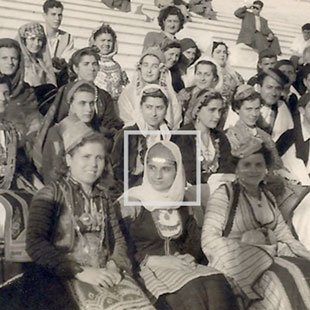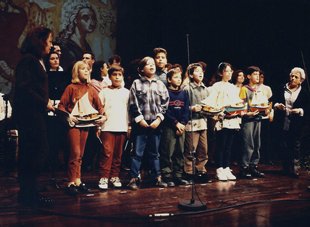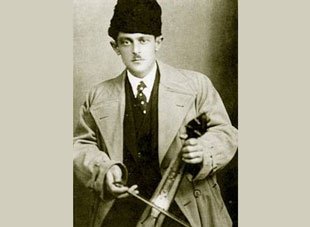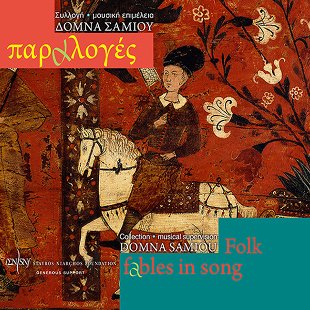You are at: Home page Her Work List of Songs As Long as the Shore
The Maid Slain by Her Brothers
Όσο ’ναι μάκρος του γιαλού
Listen
Lyrics
As long as the shore,
as long as the shore and as wide as the sea,
that’s the span of the yarn
a maid had laid out in her yard for weaving.
The king’s son passed by and bade her good morning:
– A fine morning to you, fair maid, may your work go well;
[your mind is on your weaving, for you have quite forgotten me.
– I’ve not forgotten you, king’s son, nor cast you from my mind,
I have yarn for you laid out, a loom for you to weave on.
You are the cloth I weave, you are my loom,
and on my wooden shuttle I have painted your face.
Her mother was watching through the window.
– Daughter, daughter, to your brothers
I’ll condemn you or see you in Hell.
That night, three brothers gathered round the house.
With nought to discuss of note, talk turned
to maids fair and foul and to girls led astray.
Then Konstantis, the youngest, began to praise his sister.
– Hush, Konstantis, pray don’t crow so:
you had but one sister and her honour’s gone.
– But mother, who seduced her, who led her into temptation?
– The king’s son seduced her, the prince led her into temptation.
One grabbed her hair, the other her arm
and Konstantis, the youngest, stuck in the knife.
Her mother rocked back and forth,
pulling at her hair in mourning,
– Tell me, daughter, what should I dress you in?
The pink or the blue, your velvet or your silken gown?
– Neither the pink nor the blue,
not my velvet nor my silken gown.
Mother, with what you’ve done to me, I’m fine just as I am.
I beg you, have my brothers do me this one favour.
Let them bear my body past the king’s son’s home.
They did as she bid and bore her past the prince’s home,
and the king’s son spied them through his window.
– Whose is that poor, bloodied corpse?
– The fair maid’s, the beauty’s, your beloved’s.
On his finger he wore a diamond ring,
gold filigree all around a dose of deadly poison.
He brought it to his lips and soul and body parted ways.
– Go bury the both of us in but a single tomb.
When they went and buried the both of them in a single tomb,
the girl grew into a lemon tree and the boy into a cypress.
Now the cypress bends low and kisses the little lemon tree,
the lemon tree bends low and kisses the cypress.
A queen was looking down from her lofty palace,
– Behold the little rascals, how playful they are
what they did alive they now do in death.]
Translated by Michael Eleftheriou
Original Lyrics
Όσο ’ναι μάκρος του γιαλού
Η κόρη που τη σκοτώνουν τα αδέλφια της
Όσο ’ναι μά- όσο ’ναι μάκρος του γιαλού,
όσο ’ναι μάκρος του γιαλού και φάρδος του πελάγου,
και φάρδος του πελάγου,
τόσο πανί, τόσο πανί διαζότανε1,
τόσο πανί διαζότανε μια κόρη στην αυλή της.
Του ρήγα γιος επέρασε και την καλημερίζει.
– Καλή σου ημέρα λυγερή, καλώς τα πολεμάεις2,
[έπεσε ο νους σου στο πανί και μένα με ξεχάνεις.
– Δε σε ξεχάνω, ρήγα γιε, ούτ’ απ’ το νου μ’ σε βγάζω,
σ’ έχω πανί και διάζομαι, σ’ έχω αργαλειό και υφαίνω
κι απάνω στο ξυλόχτενο σ’ έχω ζωγραφισμένο.
Η μάνα της εκοίταζε από το παραθύρι.
– Για στάσου, στάσου κόρη μου, κι αν δε σε διαβάλω
κι αν δεν το ’πώ στ’ αδέρφια σου, στον Άδη να σε βάλω.
Το βράδυ μαζευτήκανε τρεις αδερφοί στο σπίτι,
αφιλογή3 δεν είχανε, κι αφιλογή εφέραν
για τσ’ έμορφες, για τσ’ άσχημες και για τις πλανεμένες.
Κι ο πιο μικρός ο Κωσταντής παινάει την αδερφή του.
– Για σώπα, σώπα Κωσταντή και μην πολυκαυχιέσαι,
μιαν αδερφή την είχατε και κείνη πλανεμένη.
– Μάνα μ’ και ποιος την πλάνεψε και είναι πλανεμένη;
– Του ρήγα γιος την πλάνεψε και είναι πλανεμένη.
Ένας την πιάνει απ’ τα μαλλιά και άλλος απ’ το χέρι
κι ο πιο μικρός ο Κωσταντής της μπήγει το μαχαίρι.
Η μάνα της μπαινόβγαινε με τα μαλλιά στα χέρια.
– Για πες μου, πες μου κόρη μου, τι ρούχα να σε βάλω,
θέλεις τα ροζ, θέλεις τα μπλε, θέλεις τα βελουδένια,
θέλεις και τα μεταξωτά, τ’ αραχνοϋφαμένα;
– Ούτε τα ροζ ούτε τα μπλε ούτε τα βελουδένια
ούτε και τα μεταξωτά, τ’ αραχνοϋφασμένα.
Μάνα μ’ έτσι που μ’ έκανες, καλά ’μαι και με τούτα.
Παρακαλώ τ’ αδέρφια μου μια χάρη να μου κάνουν,
να πα να με περάσουνε ’π’ του ρήγα γιου το σπίτι.
Πήγαν και την περάσανε ’π’ του ρήγα γιου το σπίτι,
του ρήγα γιος εκοίταζε από το παραθύρι.
– Τίνος λείψανο είναι αυτό το καταματωμένο;
– Της λυγερής, της ξακουστής, της αγαπητικιάς σου.
Στο χέρι του εφόραγε διαμάντι δαχτυλίδι,
τριγύρω γύρω μάλαμα και μέσα το φαρμάκι.
Στα χείλη του το έσυρε και βγήκε η ψυχή του.
– Να πα να μας ε-θάψετε τα δυο σ’ ένα μνημόρι.
Πήγανε και τα θάψανε τα δυο σ’ ένα μνημόρι,
η νέα βγήκε λεμονιά κι ο νέος κυπαρίσσι,
χαμολυγάει το κυπαρίσσ’ φιλάει τη λεμονίτσα,
χαμολυγάει η λεμονιά, φιλάει το κυπαρίσσι.
Βασίλισσα εκοίταζε από ψηλό παλάτι.
– Ιδές τα, τα μαργιόλικα και τα μαργιολεμένα,
κείνα που κάναν ζωντανά κάνουν και πεθαμένα.]
1διαζότανε: ετοίμαζε το στημόνι για να το βάλει στον αργαλειό, δουλειά που συνήθως γίνεται σε ανοιχτό χώρο
2καλώς τα πολεμάεις: προσφώνηση προς εργαζόμενο, καλή δουλειά!
3αφιλογή: συζήτηση, κουβέντα
Information
- Region: Propontis
- Area: Roda
- Categories: Fable Song (Ballad)
- Duration: 02:07
Collaborators
- Singer: Soultana Bogri
- Informant (source of the song): Soultana Bogri
Albums
Notes
Many fables deal with young, ill-fated love, a subject which is often linked to arbitrariness and violence within the family. As the song form most likely turns listener’s thoughts to social conditions and human nature through their constantly vacillating treatment of good and evil, long fables encourage a critical engagement on numerous levels with the social mores they highlight. The cruel tales they relate, which reiterate hymn-like a society’s strict unwritten laws, were certainly intended to serve as an example while every act of violence –even by way of punishment– is condemned as illogical and groundless, and the singer identifies with the victim.
The song (Giannos and Vangelio) falls into this same category. In both, an unjust death is followed by suicide. And in both cases, the mother is ultimately to blame for the death as the upholder of an inflexible moral code and, as we now know, the victim of various psychological syndromes. The young people are buried side by side and the trees which grow above their adjacent tombs blow in the wind, allowing the star-crossed lovers tenderly to embrace in death. Miranda Terzopoulou (2008)
Recording information
Domna Samiou taped the song in Nea Roda, Chalkidiki, in 1984.
Member Comments
Post a comment
See also
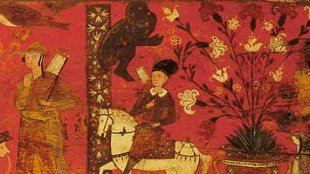

Song
A Maid Was Singing Longingly

Song
A Maid Would Have Her Way

Song
A Trader Made His Way

Song
Dawn Glowed in the East

Song
Evyenoula
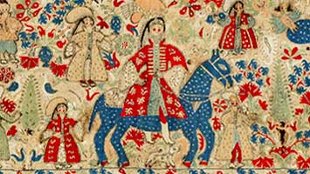
Song
Fair Evgenoula

Song
Forty Stonemasons

Song
Giannos and Vangelio

Song
I Passed by and Bade Good Day

Song
Little Apple Tree Perched on the Brink

Song
On Saint George's Eve

Song
The Dead Brother

Song
The Dead Brother


